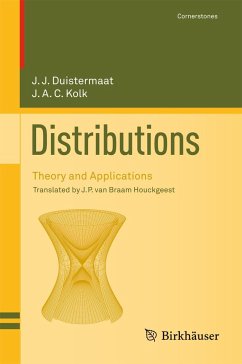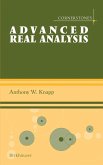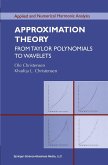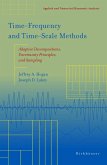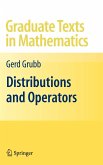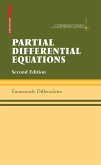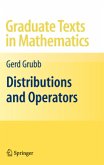This textbook is an application-oriented introduction to the theory of distributions, a powerful tool used in mathematical analysis. The treatment emphasizes applications that relate distributions to linear partial differential equations and Fourier analysis problems found in mechanics, optics, quantum mechanics, quantum field theory, and signal analysis. The book is motivated by many exercises, hints, and solutions that guide the reader along a path requiring only a minimal mathematical background.
I am sure that something must be found. There must exist a notion of generalized functions which are to functions what the real numbers are to the rationals (G. Peano, 1912) Not that much effort is needed, for it is such a smooth and simple theory (F. Tre`ves, 1975) In undergraduate physics a lecturer will be tempted to say on certain occasions: "Let ?. x/ be a function on the line that equals 0 away from 0 and is in?nite at 0 in such a way that its total integral is 1. The most important property of ?. x/ is exempli?ed Z by the identity 1 . x/?. x/ dx D . 0/; 1 where is any continuous function of x. " Such a function ?. x/ is an object that one frequently would like to use, but of course there is no such function, because a function that is 0 everywhere except at one point has integral 0. All the same, it is important to realize what our lecturer is trying to accomplish: to describe an object in terms of the way it behaves when integrated against a function. It is for such purposes that the theory of distributions, or "generalized functions," was created. It can be formulated in all dimensions, its mathematical scope is vast, and it has revolutionized modern analysis.
I am sure that something must be found. There must exist a notion of generalized functions which are to functions what the real numbers are to the rationals (G. Peano, 1912) Not that much effort is needed, for it is such a smooth and simple theory (F. Tre`ves, 1975) In undergraduate physics a lecturer will be tempted to say on certain occasions: "Let ?. x/ be a function on the line that equals 0 away from 0 and is in?nite at 0 in such a way that its total integral is 1. The most important property of ?. x/ is exempli?ed Z by the identity 1 . x/?. x/ dx D . 0/; 1 where is any continuous function of x. " Such a function ?. x/ is an object that one frequently would like to use, but of course there is no such function, because a function that is 0 everywhere except at one point has integral 0. All the same, it is important to realize what our lecturer is trying to accomplish: to describe an object in terms of the way it behaves when integrated against a function. It is for such purposes that the theory of distributions, or "generalized functions," was created. It can be formulated in all dimensions, its mathematical scope is vast, and it has revolutionized modern analysis.
From the reviews:
"This is a fantastic book...Even in this enlightened age, the theory of distributions is a highly misunderstood and undervalued business...All of this notwithstanding, learning it from the extant standard sources has always been a rather an austere affair...Distributions: Theory and Applications is laden with examples and exercises...[The book] comes equipped with a long section containing solutions to selected exercises. Distributions: Theory and Applications is much more than a textbook for a one-semester introduction to the indicated subject: the reader/student who hangs in, reads the text while filling the margins and a notebook or two (or three, or four) along the way, and wrestles with the exercises, will be more than ready for more advanced works in the area as well as the business of applying distributions in a number of nontrivial settings. Additionally he will have been exposed to a great deal of serious mathematics from, if you'll pardon the pun, all over the spectrum."
BLL - The Basic Library List Committee suggests that undergraduate mathematics libraries consider this book for acquisition. -MAA Reviews
"[Distributions: Theory and Applications] is a very useful, well-written, self contained, motivating book presenting the essentials of the theory of distributions of Schwartz, together with many applications to different areas of mathematics, like linear partial differential equations, Fourier analysis, quantum mechanics and signal analysis...One of the main features of this book is that many clarifying examples, presented with full detail, are included in the text. Moreover, a large number of problems is included at the end of each chapter...This reviewer found the book under review very stimulating, informative and inviting to further study. It is a very useful text for students who want to learn the theory of distributions, for experts in the abstract theory whowant to read an application-oriented presentation with many examples and, last but not least, for mathematicians in related areas or theoretical physicists who need a self-contained, reasonable short presentation of the theory. I would strongly recommend it to all my colleagues." -Zentralblatt MATH
"The aim of this book is to present the theory of distributions of Laurent Schwartz in a rigorous, accessible way, together with applications to linear partial differential equations, Fourier analysis, quantum mechanics and signal analysis. The text of Duistermaat and Kolk emphasizes applications to natural sciences like optics, quantum field theory, signal reconstruction or computer tomography. The exposition stresses applications and interactions with other parts of mathematics...It is a useful text for students who want to learn the theory of distributions, for experts in the abstract theory who want to read an application-oriented presentation with many examples, and also for mathematicians in related areas or theoretical physicists who need a self-contained presentation of the theory. The book includes many clarifying examples, presented in full detail. Many exercises and problems, with different levels of difficulty, are included at the end of each chapter. A reader who tries to solve them will re-examine many aspects of analysis of several variables in the light of the theory of distributions. Complete solutions of 146 of the 281 problems are provided and hints are given for many others.
In summary, this is a useful, well-written, self-contained book about the theory of distributions of Schwartz and applications to different areas of mathematics and physics. Although there are many good books that present an introduction to the theory of distributions of Schwartz, assuming different levels of knowledge of linear functional analysis, the text of Duistermaat and Kolk is a very welcome addition. In the opinion of this reviewer, thisis a stimulating, informative book that invites further study, and I strongly recommend it to any readers interested in this topic." -Mathematical Reviews
"This is a wonderful graduate level book providing a modern introduction to distribution theory with several entrance points for deeper tours into advanced analysis and applications. The lucid discussions of the development of certain key notions and the fine careful proofs define it as a valuable text book for a corresponding university course. ... even in independent self-study the reader has a fair chance to obtain a reasonable amount of working knowledge ... ." (G. Hörmann, Monatshefte für Mathematik, Vol. 163 (1), May, 2011)
"The authors have set out to produce a text on distribution theory accessible to undergraduate (or beginning graduate) students at the point in their studies where it could serve as an alternative to a beginning course in measure theory. ... The authors discuss many fascinating results in distribution theory, with an emphasis on the use of the subject in linear PDEs ... . The book succeeds both as a basic and as a rich account of results in distribution theory." (Michael Taylor, SIAM Review, Vol. 54 (3), 2012)
"This is a fantastic book...Even in this enlightened age, the theory of distributions is a highly misunderstood and undervalued business...All of this notwithstanding, learning it from the extant standard sources has always been a rather an austere affair...Distributions: Theory and Applications is laden with examples and exercises...[The book] comes equipped with a long section containing solutions to selected exercises. Distributions: Theory and Applications is much more than a textbook for a one-semester introduction to the indicated subject: the reader/student who hangs in, reads the text while filling the margins and a notebook or two (or three, or four) along the way, and wrestles with the exercises, will be more than ready for more advanced works in the area as well as the business of applying distributions in a number of nontrivial settings. Additionally he will have been exposed to a great deal of serious mathematics from, if you'll pardon the pun, all over the spectrum."
BLL - The Basic Library List Committee suggests that undergraduate mathematics libraries consider this book for acquisition. -MAA Reviews
"[Distributions: Theory and Applications] is a very useful, well-written, self contained, motivating book presenting the essentials of the theory of distributions of Schwartz, together with many applications to different areas of mathematics, like linear partial differential equations, Fourier analysis, quantum mechanics and signal analysis...One of the main features of this book is that many clarifying examples, presented with full detail, are included in the text. Moreover, a large number of problems is included at the end of each chapter...This reviewer found the book under review very stimulating, informative and inviting to further study. It is a very useful text for students who want to learn the theory of distributions, for experts in the abstract theory whowant to read an application-oriented presentation with many examples and, last but not least, for mathematicians in related areas or theoretical physicists who need a self-contained, reasonable short presentation of the theory. I would strongly recommend it to all my colleagues." -Zentralblatt MATH
"The aim of this book is to present the theory of distributions of Laurent Schwartz in a rigorous, accessible way, together with applications to linear partial differential equations, Fourier analysis, quantum mechanics and signal analysis. The text of Duistermaat and Kolk emphasizes applications to natural sciences like optics, quantum field theory, signal reconstruction or computer tomography. The exposition stresses applications and interactions with other parts of mathematics...It is a useful text for students who want to learn the theory of distributions, for experts in the abstract theory who want to read an application-oriented presentation with many examples, and also for mathematicians in related areas or theoretical physicists who need a self-contained presentation of the theory. The book includes many clarifying examples, presented in full detail. Many exercises and problems, with different levels of difficulty, are included at the end of each chapter. A reader who tries to solve them will re-examine many aspects of analysis of several variables in the light of the theory of distributions. Complete solutions of 146 of the 281 problems are provided and hints are given for many others.
In summary, this is a useful, well-written, self-contained book about the theory of distributions of Schwartz and applications to different areas of mathematics and physics. Although there are many good books that present an introduction to the theory of distributions of Schwartz, assuming different levels of knowledge of linear functional analysis, the text of Duistermaat and Kolk is a very welcome addition. In the opinion of this reviewer, thisis a stimulating, informative book that invites further study, and I strongly recommend it to any readers interested in this topic." -Mathematical Reviews
"This is a wonderful graduate level book providing a modern introduction to distribution theory with several entrance points for deeper tours into advanced analysis and applications. The lucid discussions of the development of certain key notions and the fine careful proofs define it as a valuable text book for a corresponding university course. ... even in independent self-study the reader has a fair chance to obtain a reasonable amount of working knowledge ... ." (G. Hörmann, Monatshefte für Mathematik, Vol. 163 (1), May, 2011)
"The authors have set out to produce a text on distribution theory accessible to undergraduate (or beginning graduate) students at the point in their studies where it could serve as an alternative to a beginning course in measure theory. ... The authors discuss many fascinating results in distribution theory, with an emphasis on the use of the subject in linear PDEs ... . The book succeeds both as a basic and as a rich account of results in distribution theory." (Michael Taylor, SIAM Review, Vol. 54 (3), 2012)

